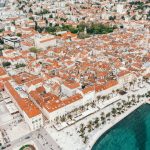We are delighted to welcome James B. Mac Donald to the TCN team. James is living in Osijek and will be playing his part in showing us that Slavonia is in fact Full of Life.
Let’s face it, Croatia is going through an important phase of history as we look to the future of becoming part of the global village. It is going to move forward quicker than any other country in Europe, as it embraces other countries with its friendly culture. The biggest influx will be from North America as they want to get away from the stress and overwhelming world they live in. This brings us to the biggest question of how to promote the Croatian Language and cultural heritage, but how? The music industry may just be the answer.
We look at the Politicians that currently hold power both have studied abroad in North America and this has helped the economics. We know that nursery rhymes have helped with memory but what about Music?
In North America the culture of music has been heavily influenced by the Latin style with its upbeat tempo. (I.e. Mark Anthony, Pitbull, and Marvin Gaye.) But who would be the new Croatian wonder? Could music be a mix of Croatian and English worked together in harmony and inspire people from overseas to have artists go there to North America. When one is currently listening to the music situation on the radio it is mostly English, some may argue otherwise based on their regional music station.
On February 24, 2016, TCN caught up with Ph.D. Ana Mikic Colic, Senior Teaching Assistant, who teaches at the Faculty of Humanities and Social Sciences, University of Osijek, with her main focus being the Croatian language. In a brief discussion we asked what music can do for the Cultural Heritage as well the mainstream pop culture?
What would music do for the artist and the Croatian Heritage?
Not only music, but culture in general, is an important part of the Croatian national identity. In recent times, besides being a rich heritage which obliges us, the culture, especially music is increasingly mentioned as an important resource for economic development and it has become unthinkable to build the identity of any region or country without serious notions of culture. Thus, culture and economy close circle of urban and economic development: cultural values form a specific image or identity of tourist attractions, and tourist attractions then draws tourists, and capital. When we talk specifically about the music, I think there is no better way of promoting Croatia as the cultural center of South-Eastern Europe, but by music. The music as a universal language that goes beyond geographical, cultural, political and all other borders is the best promoter of Croatian cultural heritage, folk customs and the Croatian language.
Would it help radio stations play more Croatian music especially with the tourists?
Like most other parts of the world, and Croatia is also affected by “Americanisation” few decades ago, or the blind and uncritical reliance on American or Westernized lifestyle. This may primarily reflect the huge popularity of foreign music, especially the music that comes from the English-speaking world. Its diffusion has certainly contributed by the development of technology that allowed to record sound. That made music easily accessible to everyone, and as a result, the music all over the world has become a major industry. The development of electronic media in the second half of the 20th century revolutionized the access and use of music in our daily lives. With a little effort we can turn on the radio or listen to music on television or the Internet. Because of the widespread, and the availability of music, fact that Croatian music hardly finds its way to local listeners, and especially to overseas is astonishing. Part of the guilt for that situation bear and Croatian radio stations. I don’t know the exact proportions of the participation of local and foreign music on Croatian radio stations, but the fact is that, especially during the tourist season, local music on radio stations could be another valuable incentive to popularize Croatian. The paradox is that during the tourist season Croatian radio stations generally adjust to the guests and foreign music dominates…
Could teachers use the artist music to help people learn English as well as newcomers learn Croatian?
Learning is always good, especially if it involves an interdisciplinary approach. Music is said to be actually a language beyond language itself. One of the proven highly effective method of learning a foreign language is through songs. Many people think that listening to music is for relaxation and fun, not thinking that it is also a very effective for improving the ability of understanding and communication in a foreign language.
How we could use the song as a method of learning? The song consists of two levels: verbal and musical, and in each of them is a story that says something. On the other hand, the prerequisite of a good pronunciation for any foreign language is listening, and what better opportunity to listen to native speakers of a language than through music?! By learning the lyrics of songs we also adopt grammatical structures. So, music and language go together. In the brain are processed in a similar way: music and language combine tones and sounds according to certain rules so it could be said that music imitates the melody of the language. There is no doubt about the benefits of learning a foreign language through music.
What do you think of existing Croatian talented artists that are doing this?
Music is a worldwide phenomenon. All the nations of the world create music because it is understandable to all cultures, and our musicians should use that fact. Any effort to promote the language and culture using music is praiseworthy, and it would be great if this trend goes beyond the limits of random and individual and became a general tendency. That will happen when we realize that the culture and the identity are two inseparable phenomena which are constantly evolving and complement each other and should form the basis for the creation of the modern image of Croatia.
What is the scenario for the music industry to try this approach even though we have not heard many Artist attempting it?
As I have already pointed out, as long as the music, and culture is not recognized as an economically payable “product” on a global scale, the situation in Croatia will not change. This means that musicians in Croatia will make commercial music that flirts with folk, and as such doesn’t have the potential to get out of the framework of the Croatian space and gain worldwide popularity. However, when it comes to this issue, I secretly hope that future will deny me…
Summer is just around the corner and these songs are the most memorable as we spend our vacations with it. It would be great if visitors brought back more than just great photos and wanted to have Croatian artist played on their music station.









